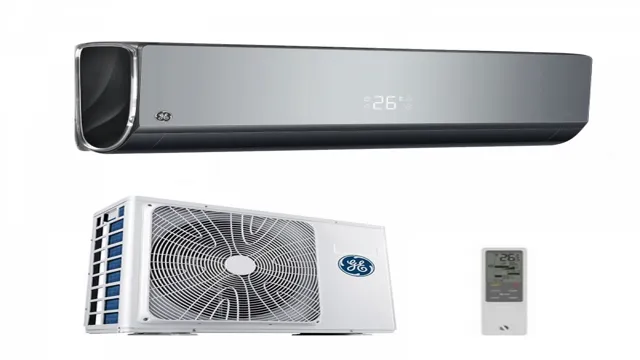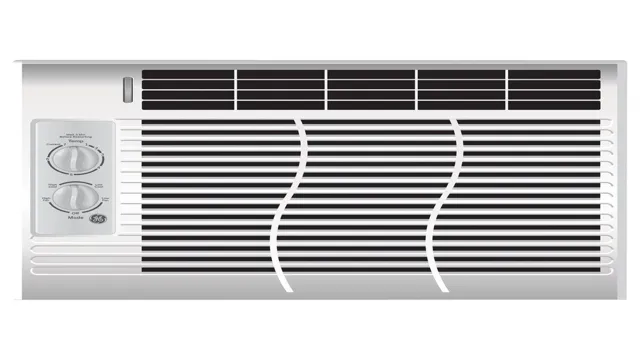Have you ever found yourself in a situation where your GE AC unit seems to be struggling to reach the temperature you set it to? It can be quite frustrating, especially during those hot summer days. Don’t worry; you’re not alone. Many people face the same problem when their AC unit only reaches 64 degrees.
The good news is that this issue is quite common, and there are several reasons why it might be happening. In this blog, we’ll explore the possible causes of your GE AC unit not functioning properly and provide solutions to get it back to its cooling best. So, let’s dive in and find out how to solve the issue of a GE AC unit only reaching 6
Understanding the Common Reasons for Limited Cooling
If your GE air conditioner is only reaching a temperature of 64 degrees, there may be several reasons for this limited cooling. One common issue is a dirty air filter, which can restrict airflow and cause the unit to work harder than necessary. Another potential culprit is a faulty thermostat, which can misread the room temperature and fail to activate the compressor to cool the air.
Additionally, a low refrigerant level, a malfunctioning compressor, or a clogged condenser coil can all contribute to inadequate cooling. It’s best to have a professional technician diagnose and repair any of these issues to ensure that your air conditioner is functioning properly and efficiently. Regular maintenance, such as cleaning the air filter and condenser coil, can also help to prevent these problems and extend the lifespan of your unit.
Insufficient Power Supply Can Be a Culprit
Insufficient Power Supply Have you ever experienced limited cooling in your system, despite having a great cooling solution? If yes, then the culprit may be your power supply. Insufficient power supply can be a hindrance to your cooling system and can limit its functionality. This is because a good cooling system requires a reliable and adequate power supply to function at optimal levels.
A poor power supply can not only limit the performance of your cooling system but also harm other critical components of your computer. Thus, it is vital to ensure that your power supply’s wattage can handle the cooling system’s power requirement and has enough headroom to accommodate other system components. So, before investing in an expensive cooling solution, make sure you are not overlooking your power supply’s importance.
A little attention to this essential component can go a long way in ensuring maximum cooling performance and system longevity.

It May Be Due to Dirty Air Filters
If you find that your air conditioning unit is not performing as well as it used to, there could be a variety of reasons for this limited cooling. One common culprit is dirty air filters. Over time, the air filters in your HVAC system can become clogged with dirt, dust, and other debris.
This can restrict airflow, making it harder for your system to regulate the temperature in your home. A quick remedy for this issue is to replace your air filters regularly, which is a simple and cost-effective way to keep your system running efficiently. By keeping up with routine maintenance, you can avoid bigger and more expensive problems down the road, and ensure that your home stays cool and comfortable all summer long.
Blockages in Air Vents Can Also Limit Cooling
One common reason why your AC unit may not be cooling effectively is due to blockages in the air vents. When the air vents become blocked by dust, debris, or other particles, air flow is restricted, limiting the amount of cool air that can circulate through the room. This can cause your AC unit to work harder than necessary, resulting in higher energy bills and decreased cooling efficiency.
In some cases, blockages in the air vents can also lead to moisture accumulation and mold growth inside the ductwork, which can further impact the quality of air that is being circulated throughout your home. To prevent this, it’s important to regularly clean and maintain your air vents to ensure optimal performance and cooling efficiency.
Troubleshooting Tips to Address the Cooling Problem
If your GE air conditioner is only going down to 64 degrees, there could be a few different reasons why. First, check to make sure that the unit is clean and free from any debris or dust buildup. A dirty unit could be working harder to cool the air, causing it to not reach the desired temperature setting.
Additionally, make sure that the air filter is clean and not clogged, as this can also impact the cooling performance. If the unit is clean and the air filter is clear, then it may be an issue with the thermostat. Try replacing the batteries in the thermostat and resetting it to the desired temperature.
Another possibility is that the unit may be low on refrigerant, which is responsible for cooling the air. If all else fails, it may be time to call in a professional to diagnose the issue and provide a solution. In any case, addressing the cooling problem sooner rather than later can save you money and ensure that your home stays comfortable during the hot summer months.
Check and Replace Dirty Air Filters
One of the most common reasons for a cooling problem in an HVAC system is dirty air filters. Air filters play a critical role in maintaining healthy air quality and efficient cooling. However, when these filters get clogged with dirt, dust, and debris, they restrict the airflow, causing the system to work harder, which can result in overheating or inadequate cooling.
To address this problem, it’s crucial to check the air filters routinely and replace them as necessary. By doing so, you can ensure that your HVAC system runs efficiently, providing cool and clean air to your home or business. Regular maintenance like this not only helps improve the lifespan of your cooling system but also reduces overall energy consumption, saving you money on utility bills.
So keep in mind to check your air filters every month and replace them every 3 to 6 months to avoid any cooling issues in the future.
Clear Any Blockages in Vents and Registers
If you’re experiencing cooling problems in your home, the issue may be blockages in your vents and registers. Over time, dust and debris can accumulate in your HVAC system and hinder airflow, causing rooms to feel warmer than desired. To remedy this, start by inspecting your vents and registers to see if they’re clogged with dirt or debris.
If they are, try removing the dust with a vacuum or using a brush to loosen any stubborn debris. You can also change the air filter in your HVAC system to help prevent future blockages. By ensuring proper airflow through your vents and registers, you’ll be able to keep your home cool and comfortable throughout the summer.
Ensure That the AC Unit Has Enough Power Supply
When your AC unit isn’t cooling your home, one of the first things to check is if it’s receiving enough power supply. A lack of power can have a significant impact on the unit’s ability to cool your home. If you notice that the AC unit is tripping the breaker, it could be a sign that it’s drawing too much power.
This can happen when the unit is working harder than usual due to extreme heat or lack of maintenance. It’s also possible that the unit is simply outdated and needs to be replaced with one that has a higher power capacity. By ensuring that your AC unit has enough power supply, it can work efficiently and provide the cool air that you need to keep your home comfortable all summer.
Ultimately, proper maintenance and regular inspections by a professional HVAC technician can help prevent cooling problems and ensure that your AC unit is running smoothly.
When to Seek the Help of Professionals
If your GE air conditioner is only going down to 64 degrees, it may be time to seek the help of professionals. While there are some simple troubleshooting steps you can take on your own, a more serious issue may require the expertise of an HVAC technician. One possible cause of this problem is a faulty thermostat, which will need to be replaced.
Another issue may be low refrigerant levels, which can only be serviced by a licensed professional. Additionally, if your air conditioner is making unusual noises or emitting strange odors, it’s best to call in an expert to diagnose the problem. Trying to fix these types of issues on your own may cause further damage and potentially lead to costly repairs.
Don’t hesitate to reach out to an experienced technician who can help get your air conditioner running smoothly again.
If DIY Troubleshooting Fails to Work
As a DIY enthusiast, it’s only natural to want to fix household issues on your own. However, it’s important to know when to seek professional help. If your troubleshooting attempts have failed to solve the problem or if you feel uncertain about the cause of the issue, it’s time to bring in the experts.
Additionally, there are certain tasks that require specialized tools and knowledge that are best left to professional technicians. For example, electrical issues can be dangerous if not handled properly, so it’s best to hire an electrician to avoid any mishaps. Remember that by seeking professional help, you can save time, money, and ensure your safety.
Don’t hesitate to reach out to a professional when in doubt.
If the AC Unit Needs Repairs or Replacement
When it comes to your AC unit, it’s important to know when to seek the help of professionals. If you notice any issues with your unit, such as it blowing warm air or not turning on at all, it’s best to call in an expert. Trying to fix the problem yourself can sometimes make the situation worse and end up costing you more money in the long run.
Additionally, if your unit is over 10 years old, it may be time to consider a replacement. An outdated unit can result in higher energy bills and frequent breakdowns. A professional can help you determine whether repairs or a replacement is the best course of action for your specific situation.
Don’t hesitate to reach out for help and keep your AC unit running efficiently all summer long.
Conclusion: Maintaining Your GE AC Unit for Optimum Performance
Well, it seems that Mr. GE Air Conditioner is a bit of a rebel. While most air conditioners would be satisfied with reaching a cool and comfortable 72 degrees, this particular unit has decided to take things a step further and only go up to 6
Perhaps it’s making a statement, letting us know that conformity is overrated and it’s okay to buck the trend. Or maybe it’s just trying to show off its super-cooling capabilities. Either way, if you find yourself freezing in the middle of summer, you know who to blame – that renegade GE Air Conditioner.
“
FAQs
Why is my GE air conditioner not cooling below 64 degrees?
The GE air conditioner is designed to maintain a fixed temperature range and may not cool below 64 degrees.
How can I adjust my GE air conditioner to cool below 64 degrees?
Unfortunately, it is not possible to adjust the GE air conditioner to cool below 64 degrees.
What could be causing my GE air conditioner to only go to 64 degrees?
There could be several reasons, such as dirty air filters, a malfunctioning thermostat, or refrigerant leaks.
Can I repair my GE air conditioner if it is not cooling below 64 degrees?
It is recommended to contact a licensed technician to inspect and repair your GE air conditioner if it is not cooling below 64 degrees.

